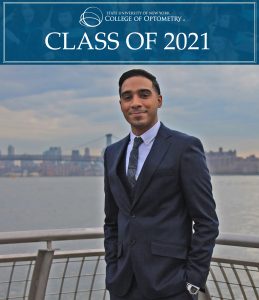MR. AND MRS. IRVING UNGER AWARD EXCELLENCE IN OPTOMETRY

A first-generation college student, Kevin Singh set a goal to work hard to achieve his doctor of optometry degree so that he would be able to serve communities where access to healthcare is limited. “I have grown up hearing the struggles of friends and family having a hard time receiving the care that they needed in my parent’s native country of Guyana. I wanted to ensure that those who have struggled to migrate to the U.S. would not face those issues again.” His passion for optometry grew while working as an ophthalmic technician in Richmond Hill, also known as “Little Guyana,” where many of those who migrate from the West Indies settle. Recipient of the Mr. and Mrs. Irving Under Award for Excellence in Optometry, Singh said that the optometric profession allows him to combine his interest in the visual arts and science to enhance the quality of life and sight, especially for people in need.
Degree: Doctor of Optometry
Hometown: Kew Gardens, NY
Undergraduate Education: CUNY City College of New York, B.S. Biology, Minor: Sociology
What draws you to optometry?
Optometry is a field where you can focus on mastering and specializing in one of the body’s most complex organs. However, it can still preview the occurrence of other systemic changes. The fact that the eye is the only place where you can directly visualize blood vessels without any invasive procedures still amazes me every day, even after examining fundus after fundus. It is through the expansion and developments made in optometry that allows optometrists to improve our patient’s worldly experiences. In addition, the field even can improve our experiences beyond the mundane world. For me, the Hindu concept of Darshan is important as it is believed that through the eyes, one can develop a divine connection between man and the beyond. The fact that I can preserve this belief for individuals is truly paramount.
What is your fondest memory of your time at the College?
My fondest moments included assisting the Collegiate Science and Technology Entry Program (CSTEP) Program for Underrepresented Minority Students led by Dr. Quy Nguyen. Before optometry school, I had the opportunity to participate in this program which helps to expose, attract and recruit minority students to the profession of optometry. It was amazing to have completed this program and then directly work with these underrepresented students as an official optometry student. It felt great to draw in future doctors from different cultures and racial backgrounds. It is much needed to help better bridge the cultural competency gap between our diverse patient base and clinicians.
How did your classmates shape your experience?
My classmates helped me find my strengths and weaknesses during optometry school. As we progressed through the rigorous program, there were many times where I excelled but also hit barricades. My friends helped foster my ability to grow and improve on my weaknesses. They helped me realize I had strong inherent clinical reasoning and critical thinking in complex ocular disease cases.
What was your favorite course?
My favorite course was Integrative Seminar with Dr. Lowe. It was an outlet to escape the lecture hall and enter real-world optometry while developing critical thinking out loud. I enjoyed regrouping with my classmates after experiencing fascinating clinical encounters and diving deep into the nuances of optometry, as everything is not always picture perfect and by the book.
What are your post-graduation plans?
I will be pursuing my passion for ocular disease as an optometrist at N.Y. Vision Group, a multi-specialty OD/MD practice where my optometric journey started in Richmond Hill, NY.
What advice would you give new students at the College?
I advise any new incoming student to the College to ensure they experience real-world optometry as much as they can. They should come in with an open mind and take every opportunity to participate in any part of a patient’s care. The more you see, the more you know, and the stronger your clinical skills will become. Lastly, I advise continuing to conduct self-research whenever something is puzzling as there is a limit to what SUNY Optometry can teach you in four years.